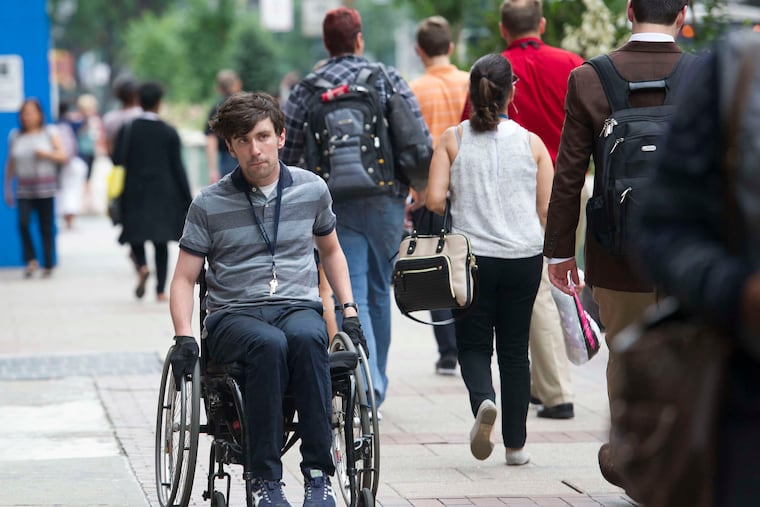PPA is planning a crackdown on sidewalk parking and blocked curb ramps that make it hard for people with disabilities to get around
Since March 2022, PPA officers carrying out regular duties have increased by 46% the number violations issued for six mobility-related offenses, including blocking accessible curb cuts.

For some, living in Philadelphia seems to confer an inalienable right to park on the sidewalk or leave your car blocking a curb cut at the corner.
Now the Philadelphia Parking Authority will target those violations for tickets because they make it difficult, and often impossible, for people in wheelchairs or with vision impairment to navigate city streets.
The agency will hire 30 new parking enforcement officers to focus on vehicles blocking sidewalks and ADA-accessible curbs, especially in neighborhoods beyond Center City, said Executive Director Rich Lazer.
“Sometimes, people pull over and park in front of this [curb] ramp and come back in a few hours,” Lazer said. “They just don’t think it affects anything or anyone. … But there are real people with disabilities who have issues going around our city because of these types of impediments.”
The new focus is in line with PPA’s emphasis on tackling quality-of-life problems in the city, an expansion of its traditional mission. The agency has a patrol unit looking for vehicles that are blocking bicycle lanes, and launched a popular program to tow abandoned vehicles. It also operates citywide red-light cameras and camera-speed enforcement along Roosevelt Boulevard.
PPA and its partner, Variety (the former Variety Club), a nonprofit serving children and young adults with disabilities in the Delaware Valley, plan to formally announce the “Mobility and Access Initiative” in mid-April, with a series of public-service announcements featuring people with disabilities struggling with blocked curb ramps and sidewalks — and urging viewers to think about whom they might be hurting with careless parking.
Enforcement would start in May, but with a warning period of three to four weeks before tickets would carry fines.
“It’s not our job to increase violations. Our goal is to change behavior,” Lazer said.
The city has estimated, using census data, that 17% of Philadelphia residents have some form of disability, which equates to about 250,000 people.
Lauren Alden of Liberty Resources, which advocate for people with disabilities, said the PPA plan is great news.
“People are constantly taking their lives in their hands because they’re forced to roll in the street,” said Alden, director of independent living services for the organization. “It’s a safety issue.”
Liberty Resources was among the groups behind a 2019 federal lawsuit against the city for violating the Americans with Disabilities Act by letting sidewalks deteriorate to impassibility and failing to build enough curb ramps. The suit was settled in 2022, with the city agreeing to a 15-year plan to fix the problems.
PPA data show its officers have increased the number of violations issued for six mobility-related offenses by 46% since March 2022, while carrying out their regular duties. A total of 63,890 tickets have been given for cars blocking accessible curb cuts and other ramps designated for people with disabilities, for instance.
Fines for parking on a sidewalk are $76 in Center City and $51 in other neighborhoods, and the same schedule applies to blocking access to accessible curb cuts and ramps. Parking in a space reserved for people with handicapped plates or placards costs violators $301 everywhere in the city.